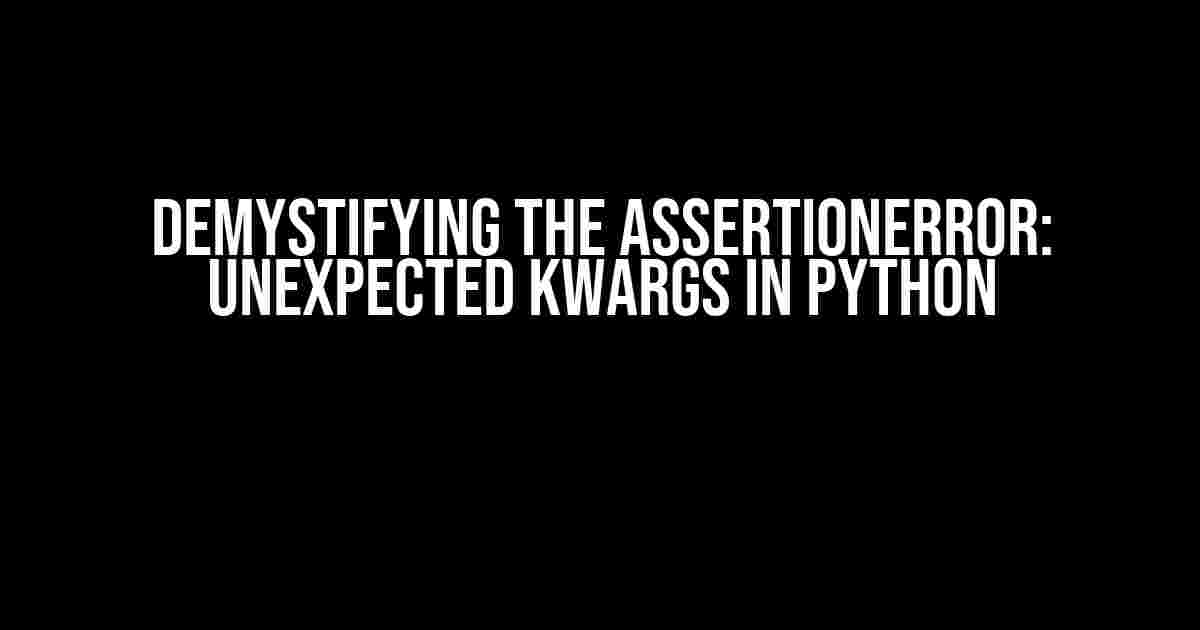Have you ever encountered an AssertionError with the message “Unexpected kwargs: {‘use_flash_attention_2’: False}” while working with Python? If so, you’re not alone! This error can be frustrating, especially when you’re not sure what’s causing it or how to fix it. In this article, we’ll delve into the world of Python errors and provide a step-by-step guide on how to resolve this AssertionError.
What is an AssertionError?
An AssertionError is a type of exception that occurs in Python when an assert statement fails. AssertionError is raised when an assertion statement (assert) fails, which means the condition being asserted is not true. In this case, the AssertionError is related to unexpected keyword arguments (kwargs) in a function call.
Understanding the Error Message
The error message “Unexpected kwargs: {‘use_flash_attention_2’: False}” indicates that a function is being called with an unexpected keyword argument ‘use_flash_attention_2’ with a value of False. This means that the function is not expecting this keyword argument, or it’s not defined in the function’s parameters.
Causes of the AssertionError: Unexpected kwargs
There are several reasons why you might encounter this AssertionError. Here are a few common causes:
- Incorrect function call: When you call a function with incorrect or unexpected keyword arguments, it can raise an AssertionError.
- Outdated library or package: Sometimes, libraries or packages may change their function signatures or parameters, which can lead to unexpected kwargs.
- Typos or incorrect variable names: A simple typo or incorrect variable name can cause the error.
How to Resolve the AssertionError: Unexpected kwargs
Now that we’ve covered the causes, let’s dive into the solution. Here’s a step-by-step guide to resolve the AssertionError:
Step 1: Check the Function Call
Double-check the function call to ensure you’re passing the correct keyword arguments. Verify that the argument names and values match the function’s parameters.
def my_function(arg1, arg2, use_flash_attention_2=True):
# function body
pass
# Correct function call
my_function("arg1_value", "arg2_value")
# Incorrect function call
my_function("arg1_value", "arg2_value", use_flash_attention_2=False)
Step 2: Check the Library or Package Documentation
Make sure you’re using the latest version of the library or package. Check the documentation to ensure the function signature hasn’t changed. If you’re using an older version, consider updating to the latest version.
| Library/Package | Version | Function Signature |
|---|---|---|
| transformers | 4.12.0 | model(input_ids, attention_mask, use_flash_attention_2=False) |
| transformers | 4.13.0 | model(input_ids, attention_mask) |
Step 3: Check for Typos or Incorrect Variable Names
Verify that there are no typos or incorrect variable names in your code. A single mistake can cause the AssertionError.
# Incorrect variable name
my_function("arg1_value", "arg2_value", use_flash_atention_2=False)
# Correct variable name
my_function("arg1_value", "arg2_value", use_flash_attention_2=False)
Best Practices to Avoid the AssertionError: Unexpected kwargs
To avoid encountering this error in the future, follow these best practices:
- Read the library or package documentation carefully to understand the function signatures and parameters.
- Use type hints and default values to ensure correct function calls.
- Test your code thoroughly to catch any errors or typos.
- Keep your libraries and packages up-to-date to ensure you have the latest function signatures and parameters.
Conclusion
In this article, we’ve explored the AssertionError: Unexpected kwargs in Python, covering the causes, solution, and best practices to avoid this error. By following these steps and being mindful of the common causes, you can resolve this error and ensure your Python code runs smoothly. Remember to stay vigilant and double-check your code to avoid any potential errors.
Frequently Asked Question
Get to the bottom of the mysterious “AssertionError: Unexpected kwargs: {‘use_flash_attention_2’: False}” error!
What is an AssertionError, and why is it so upset about “use_flash_attention_2”?
An AssertionError is a type of exception in Python that occurs when an assertion statement fails. In this case, the error message is indicating that there’s an unexpected keyword argument (kwargs) named “use_flash_attention_2” with a value of False. It’s like someone showed up to a party with an uninvited guest – the system isn’t expecting this extra parameter!
What’s the deal with “use_flash_attention_2” – is it a new dance move?
Haha, not quite! “use_flash_attention_2” is likely a parameter specific to a particular library or model, possibly related to attention mechanisms in deep learning. It’s not a standard Python or programming concept, so it’s not something you’ll find in a Python tutorial. You’ll need to check the documentation of the library or model you’re using to understand its purpose and how to handle it properly.
How do I fix this error – do I need to remove the “use_flash_attention_2” parameter?
You might need to remove or modify the “use_flash_attention_2” parameter, depending on the library or model’s requirements. Check the documentation or the function’s signature to see if this parameter is expected or if it’s been deprecated. If you’re still unsure, try removing it and see if the error persists. You might need to update your library or model to a version that handles this parameter correctly.
Is this error specific to Python, or can it happen in other programming languages?
While the specific error message is Python-related, the concept of unexpected keyword arguments can occur in other programming languages that support keyword arguments or named parameters. For example, in JavaScript, you might see an error message complaining about an unexpected property in an object. The core idea of unexpected parameters causing errors is language-agnostic!
What’s the takeaway from this error – should I be worried about my coding skills?
Don’t worry, this error is not a reflection of your coding skills! It’s simply a matter of understanding the specific requirements of the library or model you’re working with. It’s a great opportunity to learn more about the tools you’re using and how to handle edge cases. Remember, even experienced developers encounter unexpected errors – it’s all part of the learning and debugging process!
